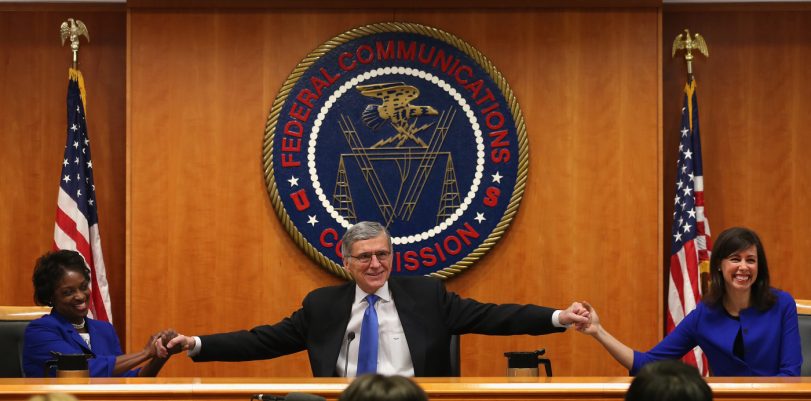When we talk about net neutrality, we are really talking about the governments, ISPs, and similar parties, groups, or institutions. The concept of the net neutrality revolves around making all of these parties treat all the data on the internet the same.
Basically, you can’t treat any type of data differently, no matter where it comes from, who is sending it, what type of content does it contain, and alike.
Net neutrality has seen a major breakthrough last year when the FCC’s privacy policy got a much-needed support. According to this privacy policy, ISPs will have to respect the net neutrality and they would not have a permission to just collect and sell your data to whomever they please. At least not without your consent.
They would also have to stop throttling the connection and even stop decreasing the users’ bandwidth on purpose. This would help improve users’ speed, security, as well as privacy. However, as we now know, this privacy policy never quite saw the light of day, despite the fact that it was so close.
Opposition to net neutrality
The FCC’s rules concerning the net neutrality were almost applied, but then the privacy policy got revoked by the Senate. It was their decision to go with a new legislation, one that will favor the ISPs and advertising companies instead of Internet users.
Thanks to the new legislation, the ISPs now have complete control over your private data, mainly browsing history. They can sell it to whomever they wish at their own will, and they don’t need you or your permission anymore.
FCC is still trying to make a comeback and think of a system that would benefit users, but way too many organizations would suffer from it. Because of it, they stand in FCC’s way, while the rules on net neutrality barely protect anyone now.
IPSs and advertisers would suffer the most, so it is only natural that they are the majority of FCC’s opposition. Still, FCC itself is still trying to come up with new rules that might turn the situation around.
Current rules are weak
Many agree with the fact that the rules currently in place are way too weak, and that the can’t protect anyone. The co-founder and current CEO of Netflix, Reed Hastings, has also said that this is true. In fact, the rules are so weak, that Netflix actually had to pay several ISPs in order for them to allow faster streaming.
The current regulations are on shaky foundations, and treating so many companies this way is bad for their business. At the same time, they are really badly enforced, so the ISPs can afford to act like there are no rules at all.
Monopoly over info and content
Net neutrality’s point is to allow everyone the same approach to the information. To reduce, or even completely revoke all the restrictions when it comes to online content. That way, users would have access to everything they want to see, companies like Netflix would return to business as normal, and ISPs would not have the ability to discriminate certain users based on the type of their info or their device.
Still, the ISPs and the current regime have the support of the new US government. Thanks to that, they are doing whatever they want, and they can get away with it.
What can you do about it?
There are a few things for you to do. For example, you can give your support to the FCC. Lend them your voice directly, and comment on their net neutrality proposal. You have it until August 17 to do so. Millions of users have already given their voice of support, but that doesn’t mean that they don’t want your voice too.
Apart from that, all you can do is go against the ISPs by hiding your online actions. The best way to do so is by using a VPN.
VPNs are Virtual Private networks, which can help you stay safe during your browsing sessions. They were originally created as a way for companies to communicate without loosing valuable info to spies. However, regular users soon found out about them, and the VPN got popular.
Now, they can employ methods like security protocols, encryption, and server networks, as well as many other useful features in order to protect your data. Thanks to the current situation, their popularity has gone through the roof once more. Because of this, there are hundreds of them out there now.
Because of that, choosing a good one can become quite a problem. We can recommend using TorGuard, as it performance was especially satisfying when we put it through our own tests. It will definitely provide strong protection and reliable service.
 |
 |
|
|---|---|---|
| Multi-platform Compatible | ||
| 256-AES Encryption | ||
| PRICE | $5 for 1 month with code "best10VPN" | $6.95 a month |
| Website Rating | 9.9 | 8.8 |
| 24/7 Live Chat | ||
| Residential / Dedicated IP for permanent streaming access | ||
| Has Mobile App + PC / Mac Support | ||
| Stealth VPN / Advanced Obfuscation techniques | ||
| Visit VPN Provider | Visit TorGuard | Visit PIA |
Conclusion
The situation does not look good when it comes to net neutrality at the moment. These issues are common in many countries around the world as well, and the US is not alone.
The best that you can do right now is try to help FCC with pushing their privacy rules once more. In the meanwhile, rely on VPNs to protect you, and to keep you safe. Otherwise, you can consider yourself helpless and without any protection, which is probably not the best position.
